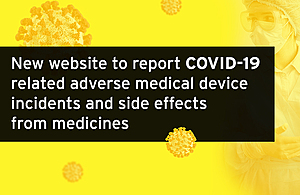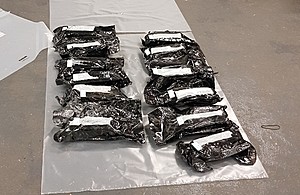Coronavirus test, track and trace plan launched on Isle of Wight
- Isle of Wight announced as first phase of new ‘test, track and trace’ programme
- Rollout of NHS COVID-19 App to begin with the island’s NHS and council staff tomorrow, with all island residents to get access from Thursday
- Data privacy and security paramount, with National Cyber Security Centre involved in app development
- The app will be complemented by enhanced contact tracing using existing methods online and over the phone
Isle of Wight residents will be the first to be offered access to a new contact tracing app, as part of government action to test, track and trace to minimise the spread of COVID-19 and move towards safely reducing lockdown measures.
Everyone on the island will receive access to the official NHS COVID-19 contact tracing app from this Thursday, with NHS and council staff able to download from 4pm tomorrow, Tuesday 5 May.
Part of a new test, track and trace programme, the app will work together with enhanced contact tracing services and swab testing for those with potential COVID-19 symptoms to help minimise the spread of COVID-19.
Developed by NHSX, the technology arm of the health service, and a team of world-leading scientists and doctors, the app is designed to significantly speed up contact tracing, helping reduce the chance of the virus spreading by enabling us to rapidly identify people most at risk of infection so they can take action to protect themselves, the people they care about and the NHS.
When someone reports symptoms through the app, it will detect any other app users that the person has been in significant contact with over the past few days, including unknown contacts such as someone they may have sat next to on public transport. The app will be able to anonymously alert these contacts and provide advice, including how to get a test to confirm whether or not they do have COVID-19. Users will be able order tests through the app shortly.
For those who may not have access to the app, or the ability to use a smartphone, there will be an option to report symptoms and order tests in other ways. As the integrated service develops, everyone who reports symptoms, including app users, will also be asked to record recent contacts using an online service (or through a telephone interview if they prefer), so that contact tracers can reach all contacts who may be at risk, whether or not those contacts are app users. Contacts will then be alerted either by the app or by email or telephone, advising them to self-isolate or offering public health advice.
As the test, track and trace programme rolls out nationally, expected in mid-May, Public Health England will oversee the deployment of 18,000 additional contact tracers to support the programme.
This first phase is a major step forward in the government’s next phase of the coronavirus strategy and will improve understanding of how this new integrated approach to test, track and trace will work for the rest of the population.
NHS and council staff will be emailed a download link on Tuesday afternoon. From Thursday the app will then open for all residents on the Isle of Wight. All households will receive a leaflet with clear instructions on how to download and use the app on Thursday, and a targeted marketing campaign will begin on Friday.
Health and Social Care Secretary Matt Hancock said:
The Isle of Wight is playing a vital role with this pioneering work to help keep Britain safe. This will pave the way for a nationwide roll-out when the time is right.
Coronavirus is one of the greatest challenges our country has ever faced and this app will play a vital role in getting Britain back on her feet.
The app will help control the spread of coronavirus by alerting people they may have come into contact with it and recommending appropriate action.
This ground-breaking technology, combined with our heroic frontline health and social care staff, and both a nationwide contact tracing testing programme will ensure that we remain in the best position to move toward easing the lockdown.
Matthew Gould, Chief Executive of NHSX, said:
Technology can help us get the country back on its feet.
By launching the NHS COVID-19 app we can reduce transmission of the virus by alerting people who may have been exposed, so they can take action to protect themselves, the people they care about and the NHS.
When combined with testing and enhanced web and phone contact tracing, this will help the country return to normality and beat coronavirus.
Deputy Chief Medical Officer, Professor Jonathan Van Tam, said:
By widespread testing those suspected to be infected with coronavirus, tracing their contacts and where appropriate advising them to self-isolate, we can slow the onward spread of the virus. This new app-based system, developed by technology experts in partnership with clinicians and scientists, will run alongside traditional contact tracing by PHE. If uptake and use is widespread it will give us the greatest room for manoeuvre to ease other social distancing measures.
Dr Yvonne Doyle, Medical Director and Director of Health Protection at Public Health England, said:
Alongside the NHS COVID-19 app, PHE’s phone and web-based contact tracing will be a critical part of the government’s strategy to get the country back on its feet.
Taking these first steps on the Isle of Wight will help us prepare for a scale up of our contact tracing capacity, with an 18,000 strong team ensuring the contacts of confirmed COVID-19 cases are followed up and given the information they need.
The government has collaborated internationally and learned from examples of best practice across the world, which has informed the development of a bespoke approach that is right for the unique needs of the UK. The app uses similar Bluetooth low energy technology to that employed by Australia, Norway, and Singapore among others.
The privacy and security of users’ data is a priority and NHSX has involved experts from the National Cyber Security Centre to advise on best practice through the app’s development. Data will only ever be used for NHS care, management, evaluation and research and the NHS will comply fully with the law around its use, including the Data Protection Act.
The Isle of Wight was chosen to trial the project because it has a single NHS trust that covers all NHS services on the island.
Its geography as an island with a sizeable population makes it an ideal place to introduce the NHS COVID-19 app and wider testing service in its initial roll-out period.
Isle of Wight Council leader Dave Stewart said:
On behalf of the island I am very pleased we can be the first place to use this new digital technology in the country.
I have always been keen to ensure we keep our special community safe from the virus but at the same time explore ways to enable us to get back up on our feet and move forward from it. This scheme offers the tightly controlled approach we need to help us do just that.
Widespread tracing and testing holds the key to this ambition and if we are able to help the country move forward then the island will also have done its part in helping government in tackling this virus and re building our lives through safe social distancing when the time is right.
I am sure islanders will rise to the challenge and help avoid post lockdown spread of the virus and keep people as safe as possible.
The ambition of test and trace is to enable the UK to start to come out of some elements of lockdown. This will be a gradual process and our experts are considering how best to do this in a way that keeps citizens safe and protects our NHS.
Background information
The Department of Health and Social Care (DHSC) and NHSX have created some digital assets to support media coverage of the app launching this week.
Download an HMG explainer video for social channels.
Download screenshots of the app without IoW specifics.
Download shots of app on phone in hand.
Isle of Wight residents will be provided with a range of comprehensive information about what this means for them, including advice on how to access and use this new app. Their safety will be of paramount importance during the programme, and the government and NHS are clear that no-one will be put at risk throughout its duration. For example the current social distancing measures will remain in place.
Maggie Oldham, Chief Executive at Isle of Wight NHS Trust, said:
Our community’s response to coronavirus has been fantastic and I want to say thank you for everything they have done to protect the NHS and to save lives.
It is good news for the island that we have been chosen as the first site in the UK for this app, we can protect local people and play an important role in the national effort to beat coronavirus.
Isle of Wight MP Bob Seely said:
My priority is to keep islanders safe. I want us to be able to find and isolate the virus here and make our island safe again. If that can happen first in the country, so much the better.
It’s important that we are clear what is happening. I want to reassure islanders that this is not a lifting of lockdown. This first stage is about finding out where the virus is now. This is to protect the NHS and save life.
This is important news for the island. We will be leading the country in terms of using the very latest technology to keep us safe and halt the spread of this wretched coronavirus.
We have a moral duty to protect life now, but we also need to protect life in future. This pilot scheme is an important stage of getting life back to normal in time and I am proud that the island is leading the way.
The app has been designed to give people a simple way to make a difference and to help keep themselves and their families safe. Once someone installs the app, it will start logging the distance between their phone and other phones nearby that also have the app installed using Bluetooth low energy.
This anonymous log of how close people are to each other will be stored securely on their phone. If a user becomes unwell with symptoms of COVID-19, they can choose to allow the app to inform the NHS which, subject to sophisticated risk analysis, will trigger an anonymous alert to those other app users with whom they came into significant contact over the previous few days.
The app will advise the public what action to take if a user has been close to someone who has become symptomatic. The advice on what people should do can be adapted as the context and approach evolves.
Modelling by academics at Oxford University’s Big Data Institute shows that the app has the potential to save thousands of lives, and that for every 1 to 2 people who download the app, an infection could be prevented.


